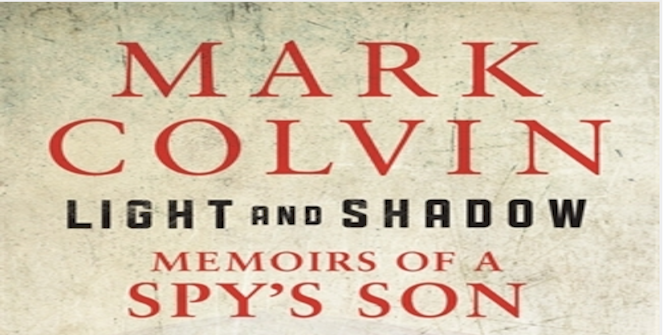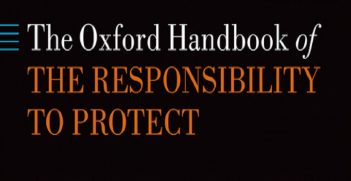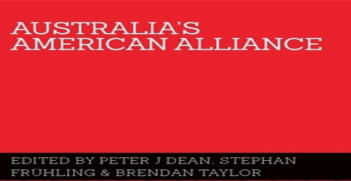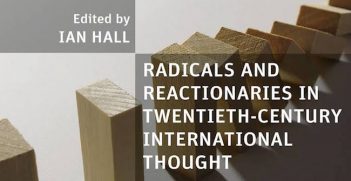Reading Room: Light and Shadow, Memoirs of a Spy’s Son

If we’d had a competition for the most admired voice in Australian broadcasting, certainly the most distinctive, chances are the late Mark Colvin would have earned the votes of his peers.
Mark might have shied from the comparison but if we reach for an example of those who made the art of broadcasting appear effortless, names like the BBC’s Richard Dimbleby come to mind or CBS’s Walter Cronkite in his descriptions of the Kennedy assassination or Alistair Cooke in his ‘Letter from America’ or my favorite among legions of BBC foreign correspondents, Anthony Lawrence, who surveyed our region from his perch in Hong Kong during the Vietnam war-era.
These individuals made it appear that they were having not much more than a conversation over a cup of tea with a maiden aunt. They engaged you by talking to you, rather than at you. That is the art of broadcasting, and art it is. What all of the above had in common was that they were journalists first and performers on radio and television second.
In his role as presenter of the PM program on ABC Radio for two decades, Mark Colvin certainly engaged the nation in good times and bad, in crisis moments and occasions when we celebrated.
It might be said of the man with a voice that was English but not too English, that had an edge but not too much of an edge, that was sceptical but not too sceptical, that was respectful to interview subjects but not too respectful, that his own broadcasting abilities reflected the title of his memoir, Light and Shadow: Memoirs of a Spy’s Son. There was plenty of light and shade in his on-air presence.
Colvin died in May, just a few months after his book was published to good notices all ’round and well-deserved. Writing a memoir that avoids being indulgent, or self-serving, or mawkish, or mean would not be easy, especially if you have lived through the sorts of ups and downs that afflicted the author in his later years.
In the end he died from complications that arose from a debilitating virus that destroyed his kidneys and otherwise caused him to be a semi-invalid in his last several decades. And yet not once in 300-plus pages do we hear one word of self-pity or complaint about the hand he was dealt after contracting an illness on assignment in Rwanda in the 1990s for the ABC.
Thereafter he found himself more or less anchored to the PM presenter’s chair where he became the “voice of the nation” in Melbourne University Press publisher Louise Adler’s words. It’s hard to disagree.
At the heart of Light and Shadow: Memoirs of a Spy’s Son is the story of a relationship between a father and son conducted at a distance and often in the shadows. Mark Colvin’s English father and Australian mother parted company when he was a schoolboy.
If there is a touch of Graham Greene and John Le Carre about this book it is because Colvin’s father’s life as an MI6 agent reflected the shadowy Cold War world in which he operated, to the point where his own son was not entirely sure what his father did until relatively late in the piece. Not The Spy Who Came in from the Cold, you might say.
Towards the end of Light and Shadow, the Colvins, father and son, have what might be called a mature-age conversation where the journalist probes the father on what propelled him to live a life of deception. Imagine the scene: two men—one post career, the other in his prime as an inquirer after what approximates the truth—sharing a bottle of red and exploring territory that had once been taboo, like a sort of no man’s land between East and West, as if they were trespassing on each other’s territory.
“What about you?” Mark Colvin asks, “Did you ever find any ambivalence or ambiguity about what you were doing?”
“Never. Not once. Not for a single minute,” John Colvin replied.
That was that. Between father and son, journalist and spy, two worlds separated, one from the other; yet when you think about it, the two avocations are not dissimilar. Journalists and spies both are gatherers of information; both rely on contacts cultivated in circumstances that might be regarded as shadowy, if not shady; both learn to keep secrets, respect confidences; and both traffic in information. The essential difference is that a spy covers his identity; a journalist exposes his or hers, or at least should do so.
I should note here that I worked with Mark Colvin at the ABC in Canberra in the Whitlam-era and shared similar experiences of that crazy period in our history. Like Mark, I operated as a foreign correspondent, for newspapers rather than radio and television. I left the ABC for The Age in 1976 as Mark was building a career that included days at the youth station that became triple j, later as a correspondent in Europe, and a stint at Four Corners.
In all these roles he excelled but none more than in his later years as presenter of PM. It is fortunate for his many friends and admirers that he lasted the distance to write his impressions of a fortunate career and a relationship with a distant, moody, secretive father.
Colvin senior wore dark glasses when he farewelled his son on the infrequent occasions they found themselves together. This was to hide his tears, not disguise his identity.
Mark Colvin, Light and Shadow: Memoirs of a Spy’s Son, Melbourne University Press, 2016
Tony Walker FAIIA is a vice chancellor’s fellow at La Trobe University, author and fellow of the Australian Institute of International Affairs. A former international editor of the Australian Financial Review, he is a two-times Walkley award winner and during his career reported for the Australian Financial Review, The Financial Times, The Age and the ABC from Beijing, Washington and Canberra among other places.





